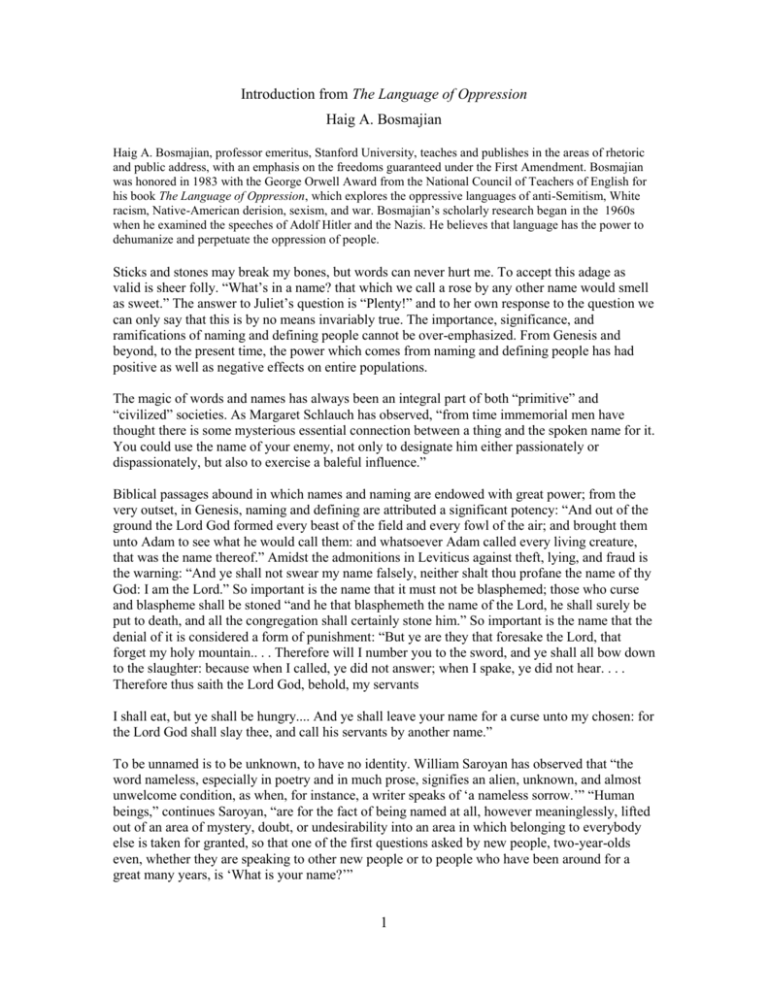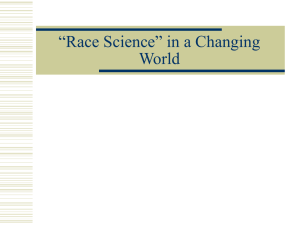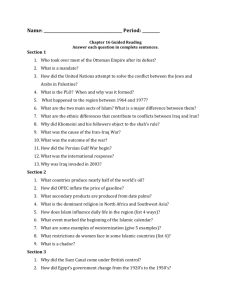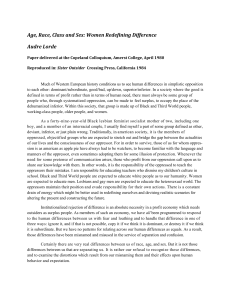Introduction from The Language of Oppression
advertisement

Introduction from The Language of Oppression Haig A. Bosmajian Haig A. Bosmajian, professor emeritus, Stanford University, teaches and publishes in the areas of rhetoric and public address, with an emphasis on the freedoms guaranteed under the First Amendment. Bosmajian was honored in 1983 with the George Orwell Award from the National Council of Teachers of English for his book The Language of Oppression, which explores the oppressive languages of anti-Semitism, White racism, Native-American derision, sexism, and war. Bosmajian’s scholarly research began in the 1960s when he examined the speeches of Adolf Hitler and the Nazis. He believes that language has the power to dehumanize and perpetuate the oppression of people. Sticks and stones may break my bones, but words can never hurt me. To accept this adage as valid is sheer folly. “What’s in a name? that which we call a rose by any other name would smell as sweet.” The answer to Juliet’s question is “Plenty!” and to her own response to the question we can only say that this is by no means invariably true. The importance, significance, and ramifications of naming and defining people cannot be over-emphasized. From Genesis and beyond, to the present time, the power which comes from naming and defining people has had positive as well as negative effects on entire populations. The magic of words and names has always been an integral part of both “primitive” and “civilized” societies. As Margaret Schlauch has observed, “from time immemorial men have thought there is some mysterious essential connection between a thing and the spoken name for it. You could use the name of your enemy, not only to designate him either passionately or dispassionately, but also to exercise a baleful influence.” Biblical passages abound in which names and naming are endowed with great power; from the very outset, in Genesis, naming and defining are attributed a significant potency: “And out of the ground the Lord God formed every beast of the field and every fowl of the air; and brought them unto Adam to see what he would call them: and whatsoever Adam called every living creature, that was the name thereof.” Amidst the admonitions in Leviticus against theft, lying, and fraud is the warning: “And ye shall not swear my name falsely, neither shalt thou profane the name of thy God: I am the Lord.” So important is the name that it must not be blasphemed; those who curse and blaspheme shall be stoned “and he that blasphemeth the name of the Lord, he shall surely be put to death, and all the congregation shall certainly stone him.” So important is the name that the denial of it is considered a form of punishment: “But ye are they that foresake the Lord, that forget my holy mountain.. . . Therefore will I number you to the sword, and ye shall all bow down to the slaughter: because when I called, ye did not answer; when I spake, ye did not hear. . . . Therefore thus saith the Lord God, behold, my servants I shall eat, but ye shall be hungry.... And ye shall leave your name for a curse unto my chosen: for the Lord God shall slay thee, and call his servants by another name.” To be unnamed is to be unknown, to have no identity. William Saroyan has observed that “the word nameless, especially in poetry and in much prose, signifies an alien, unknown, and almost unwelcome condition, as when, for instance, a writer speaks of ‘a nameless sorrow.’” “Human beings,” continues Saroyan, “are for the fact of being named at all, however meaninglessly, lifted out of an area of mystery, doubt, or undesirability into an area in which belonging to everybody else is taken for granted, so that one of the first questions asked by new people, two-year-olds even, whether they are speaking to other new people or to people who have been around for a great many years, is ‘What is your name?’” 1 To receive a name is to be elevated to the status of a human being; without a name one’s identity is questionable. In stressing the importance of a name and the significance of having none, Joyce Hertzler has said that “among both primitives and moderns, an individual has no definition, no validity for himself, without a name. His name is his badge of individuality, the means whereby he identifies himself and enters upon a truly subjective existence. My own name, for example, stands for me, a person. Divesting me of it reduces me to a meaningless, even pathological, nonentity.” In his book What Is In A Name? Farhang Zabeeth reminds us that “the Roman slaves originally were without names. Only after being sold they took their master’s praenomen in the genitive case followed by the suffix—’por’ (boy), e.g., ‘Marcipor,’ which indicates that some men, so long as they were regarded by others as cattle, did not need a name. However, as soon as they became servants some designation was called forth.” To this day one of the forms of punishment meted out to wrongdoers who are imprisoned is to take away their names and to give them numbers. In an increasingly computerized age people are becoming mere numbers— credit card numbers, insurance numbers, bank account numbers, student numbers, et cetera. Identification of human beings by numbers is a negation of their humanity and their existence. Philologist Max Muller has pointed out that “if we examine the most ancient word for ‘name,’ we find it is naman in Sanskrit, nomen in Latin, namo in Gothic. This naman stands for gnaman and is derived from the root, gna, to know, and meant originally that by which we know a thing.” In the course of the evolution of human society, R. P. Masani tells us, the early need for names “appears to have been felt almost simultaneously with the origin of speech.. . personality and the rights and obligations connected with it would not exist without the name.” In his classic work The Golden Bough James Frazer devotes several pages to tabooed names and words in ancient societies, taboos reflecting the power and magic people saw in names and words. Frazer notes, for example, that “the North American Indian regards his name, not as a mere label, but as a distinct part of his personality, just as much as are his eyes or his teeth, and believes that injury will result as surely from the malicious handling of his name as from a wound inflicted on any part of his physical organism.” A name can be used as a curse. A name can be blasphemed. Name-calling is so serious a matter that statutes and court decisions prohibit “fighting words” to be uttered. In 1942 the United States Supreme Court upheld the conviction of a person who had addressed a police officer as “a God damned racketeer” and “a damned Fascist.” (Chaplinsky v. New Hampshire, 315 U.S. 568). Such namecalling, such epithets, said the Court, are not protected speech. So important is one’s “good name” that the law prohibits libel. History abounds with instances in which the mere utterance of a name was prohibited. In ancient Greece, according to Frazer, “the names of the priests and other high officials who had to do with the performance of the Eleusinian mysteries might not be uttered in their lifetime. To pronounce them was a legal offense.” Jorgen Ruud reports in Taboo: A Study of Malagasy Customs and Beliefs that among the Antandroy people the father has absolute authority in his household and that “children are forbidden to mention the name of their father. They must call him father, daddy... . The children may not mention his house or the parts of his body by their ordinary names, but must use other terms, i.e., euphemisms.” It was Iago who said in Othello: Who steals my purse steals trash; ‘tis something nothing; Twas mine, ‘tis his, and has been slave to thousands; But he that filches from me my good name Robs me of that which not enriches him 2 And makes me poor indeed. Mice, in Lewis Carroll’s Through the Looking Glass, had trepidations about entering the woods where things were nameless: “This must be the wood,” she said thoughtfully to herself, “where things have no names. I wonder what’ll become of my name when I go in? I shouldn’t like to lose it at all—because they’d have to give me another, and it would be almost certain to be an ugly one.” A Nazi decree of August 17, 1938 stipulated that “Jews may receive only those first names which are listed in the directives of the Ministry of the Interior concerning the use of first names.” Further, the decree provided: “If Jews should bear first names other than those permitted.. . they must.., adopt an additional name. For males, that name shall be Israel, for females Sara.” Another Nazi decree forbade Jews in Germany “to show themselves in public without a Jew’s star.. . [consisting] of a six-pointed star of yellow cloth with black borders, equivalent in size to the palm of the hand. The inscription is to read ‘JEW’ in black letters. It is to be sewn to the left breast of the garment, and to be worn visibly.” The power which comes from names and naming is related directly to the power to define others—individuals, races, sexes, ethnic groups. Our identities, who and what we are, how others see us, are greatly affected by the names we are called and the words with which we are labelled. The names, labels, and phrases employed to “identify” a people may in the end determine their survival. The word “define” comes from the Latin definire, meaning to limit. Through definition we restrict, we set boundaries, we name. “When I use a word,” said Humpty Dumpty in Through the Looking Glass, “it means just what I choose it to mean—neither more nor less.” “The question is,” said Mice, “whether you can make words mean so many different things.” “The question is,” said Humpty Dumpty, “which is to be master—that’s all.” During his days as a civil rights-black power activist, Stokely Carmichael accurately asserted: “It [definition] is very, very important because I believe that people who can define are masters.” Self-determination must include self-definition, the ability and right to name oneself; the mastersubject relationship is based partly on the master’s power to name and define the subject. While names, words and language can be and are used to inspire us, to motivate us to humane acts, to liberate us, they can also be used to dehumanize human beings and to “justify” their suppression and even their extermination. It is not a great step from the coercive suppression of dissent to the extermination of dissenters (as the United States Supreme Court declared in its 1943 compulsory flag salute opinion in West Virginia State Board of Education v. Bamette); nor is it a large step from defining a people as non-human or sub-human to their subjugation or annihilation. One of the first acts of an oppressor is to redefine the “enemy” so they will be looked upon as creatures warranting separation, suppression, and even eradication. The Nazis redefined Jews as “bacilli,” “parasites,” “disease,” “demon,” and “plague.” In his essay “The Hollow Miracle,” George Steiner informs us that the Germans “who poured quicklime down the openings of the sewers in Warsaw to kill the living and stifle the stink of the dead wrote about it. They spoke of having to ‘liquidate vermin’... . Gradually, words lost their original meaning and acquired nightmarish definitions. Jude, Pole, Russe came to mean two-legged lice, putrid vermin which good Aryans must squash, as a [Nazi] Party manual said, ‘like roaches on a dirty wall.’ ‘Final solution,’ endgültige Lösung, came to signify the death of six million human beings in gas ovens. The language of white racism has for centuries been used to “keep the nigger in his place.” Our sexist language has allowed men to define who and what a woman is and must be. Labels like 3 “traitors,” “saboteurs,” “queers,” and “obscene degenerates” were applied indiscriminately to students who protested the war in Vietnam or denounced injustices in the United States . Are such people to be listened to? Consulted? Argued with? Obviously not! One does not listen to, much less talk to, traitors and outlaws, sensualists and queers. One only punishes them or, as Spiro Agnew suggested in one of his 1970 speeches, there are some dissenters who should be separated “from our society with no more regret than we should feel over discarding rotten apples.” What does it mean to separate people? When the Japanese-Americans were rounded up in 1942 and sent off to “relocation camps” they were “separated.” The Jews in Nazi Germany were “separated.” The Indians of the United States, the occupants of the New World before Columbus “discovered” it, have been systematically “separated.” As “chattels” and slaves, the blacks in the United States were “separated”; legally a black person was a piece of property, although human enough to be counted as three-fifths of a person in computing the number of people represented by white legislators. How is the forcible isolation of human beings from society at large justified? To make the separation process more palatable to the populace, what must the oppressor first do? How does he make the populace accept the separation of the “creatures,” or, if not accept it, at least not protest it? Consideration of such questions is an academic exercise without practical implications. There is a lose nexus between language and self-perception, self-awareness, self-identity, and selfesteem. Just as our thoughts affect our language, so does our language affect our thoughts and eventually our actions and behavior. As Edward Sapir has observed, we are all “at the mercy of the particular language which has become the medium of expression” in our society. The “real world,” he points out, “is to a large extent unconsciously built up on the language habits of the group. .. . We see and hear and otherwise experience very largely as we do because the language habits of our community predispose certain choices of interpretation.” George Orwell has written in his famous essay “Politics and the English Language”: “A man may take to drink because he feels himself to be a failure, and then fail all the more completely because he drinks. It is rather the same thing that is happening to the English language. It becomes ugly and inaccurate because our thoughts are foolish, but the slovenliness of our language makes it easier for us to have foolish thoughts.” Orwell maintains that “the decadence in our language is probably curable” and that “silly words and expressions have often disappeared, not through any evolutionary process but owing to the conscious action of a minority.” Wilma Scott Heide, speaking as president of the National Organization for Women several years ago, indicated that feminists were undertaking this conscious action: “In any social movement, when changes are effected, the language sooner or later reflects the change. Our approach is different. Instead of passively noting the change, we are changing language patterns to actively effect the changes, a significant part of which is the conceptual tool of thought, our language.” This then is our task—to identify the decadence in our language, the inhumane uses of language, the “silly words and expressions” which have been used to justify the unjustifiable, to make palatable the unpalatable, to make reasonable the unreasonable, to make decent the indecent. Hitler’s “Final Solution” appeared reasonable once the Jews were successfully labelled by the Nazis as sub-humans, as “parasites,” “vermin,” and “bacilli.” The segregation and suppression of blacks in the United States was justified once they were considered “chattels” and “inferiors.” The subjugation of the “American Indians” was defensible since they were defined as “barbarians” and “savages.” As Peter Farb has said, “cannibalism, torture, scalping, mutilation, adultery, incest, sodomy, rape, filth, drunkenness—such a catalogue of accusations against a people is an indication not so much of their depravity as that their land is up for grabs.” As long as adult women are “chicks,” “girls,” “dolls,” “babes,” and “ladies,” their status in society will remain “inferior”; they will go on being treated as subjects in the subject-master relationship as 4 long as the language of the law places them into the same class as children, minors, and the insane. It is my hope that an examination of the language of oppression will result in a conscious effort by the reader to help cure this decadence in our language, especially that language which leads to dehumanization of the human being. One way for us to curtail the use of the language of oppression is for those who find themselves being defined into subjugation to rebel against such linguistic suppression. It isn’t strange that those persons who insist on defining themselves, who insist on this elemental privilege of self-naming, self-definition, and self-identity encounter vigorous resistance. Predictably, the resistance usually comes from the oppressor or would-be oppressor and is a result of the fact that he or she does not want to relinquish the power which comes from the ability to define others. 5








